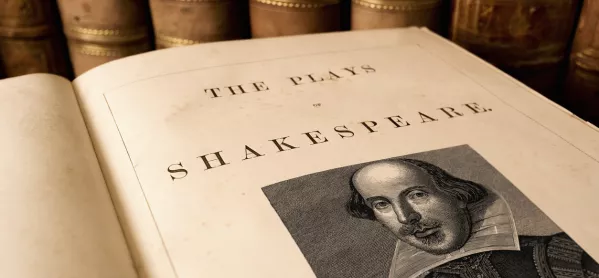- Home
- I have to teach GCSE texts over and over at key stage 3
I have to teach GCSE texts over and over at key stage 3

Shakespeare is addictive. I don’t mean this literally, of course. I don’t wake up in the morning waiting to pop another Will pill.
What I really mean is: his plays are addictive. They’re funny. They’re creative. They delve in to the innermost complexities of what it means to be human.
What’s more, as an English teacher, I’m in a somewhat privileged position. I get to teach his plays almost every term.
In between carving out a passage through the horrifically ill-thought-through English language GCSE, and telling the children that, no, your speaking and listening assessment might not count towards your final grade but you still have to do it, there is always a glimmer of hope, a golden round waiting on the department’s long term plan: Shakespeare’s Macbeth.
So, naturally, I turned up to my Year 9 lesson prepared, enthusiastic and ready to take them on a journey through Jacobean England and 11th-century Scotland.
Couldn’t quite place it
I was nervous - well, anxious is probably a better word - to see how they would react, to see how they enjoyed this first interaction with the play. I was desperate for it to be a good lesson.
They came in, glanced at the front cover of the play, a vague look of recognition in their eyes. Some mouthed the word Macbeth to themselves and looked perplexedly into space, as if scouring the deepest, darkest corners of their mind for something, anything to grab on to.
It was there: a spark, a memory, but nothing concrete, nothing tangible. They couldn’t quite place it, but they’d heard the word before.
Some thought, “Was it something I saw on telly? Surely not.” Others considered: “Was it something I read? Maybe?”
I noticed this. Their behaviour seemed strange and out of the ordinary, but I couldn’t work out why.
We began.
‘We know this’
“When shall we three meet again?”
Some heads stirred. Some sat up. They glanced around the room, trying to catch the eye of another. They knew something was wrong.
“In thunder, lightning or in rain.”
Then the hands went up. We carried on reading.
“When the hurly burley’s done.”
“Sir! Sir!” Isla said.
I motioned her to put her hand down.
“But, Sir, it’s important.”
I gave in. “What’s the matter?”
“We’ve done this. We know the whole thing.”
Ah, there is it. The reason for the perplexed looks. They’d done it before.
Of course they had. This was the handiwork of the “mastery model” - where the same GCSE skills and texts are taught throughout the entirety of a pupils’ school career, from Year 7 to 11. What a tremendous idea.
“When did you do it, Isla?”
“Last year.”
“And the year before!” another shouted.
In search of untrodden ground
“Yes, but you don’t know all of it yet, do you?” I bluffed, trying to find at least some untrodden ground.
“But we do. We really do. Macbeth gets told he’s going to be king, kills Duncan and Banquo, then gets killed by Macduff.”
“Oh yeah!” another interjected, “I was Lady Macduff when we learned this at my last school.”
Another shouted, “Isn’t there a banquet scene, with a ghost or something?”
The room descended into disorder. Some were angry at having to study the same play for at least three years in a row. Others were just plain demotivated.
As what was an intricately planned, engaging and exciting lesson was brought to rubble before my eyes I thought that I couldn’t blame the pupils.
If I was sitting where they were, I’d have been kicking off, too.
A student’s first interaction with a text needs to be handled delicately. They can, after all, only have this interaction once. Once it’s been read, it cannot be un-read, ready for the next year.
This is so important with Shakespeare. Before schools even have a chance to teach his plays, students may already view his work as boring or irrelevant. But this couldn’t be further from the truth.
A third of their lives studying the same play
When teaching Shakespeare, you don’t always have to make it interesting. It is interesting.
Except - and, unfortunately, there is an exception - when you have already spent the entirety of your secondary school life studying the same play.
It’s all right for the first year, but by year three, it’s just downright miserable. It’s repetitive.
Thankfully, my school has now reversed its policy of teaching GCSE skills and texts as far down as key stage 3.
But it’s too late for our current Year 9s, who have fallen victim to the mastery model. They were pummelled with GCSE skills and texts in Years 7 and 8.
Now, they are taking their actual GCSEs in Year 9. Their entire school career will be defined by what the GCSE dictates they should study.
For those who were unlucky enough to have been born in the wrong year, by the time they finish school, they will have spent a third of their lives studying the same play.
For them, Macbeth definitely won’t be an innocent flower, but rather the serpent under it.
Paul Judge is a secondary English teacher, working in the North East of England
Keep reading for just £1 per month
You've reached your limit of free articles this month. Subscribe for £1 per month for three months and get:
- Unlimited access to all Tes magazine content
- Exclusive subscriber-only stories
- Award-winning email newsletters


